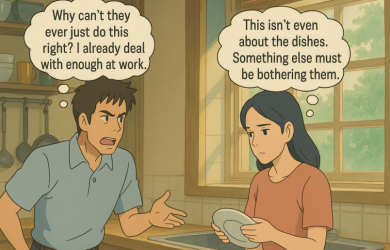3 Reasons Why Going to Bed Angry Actually Works

Unlock Daily 30-Sec Tips for a Happier Relationship
👉 Subscribe FREEKey Takeaways
Marriage.com AI Quick Summary
While many like to avoid conflict at all costs, relationship conflict can actually provide opportunities to learn more about one another’s needs and allow couples to grow closer.
While striving to resolve relationship issues is important, it’s imperative that couples recognize when conflict cannot and should not be resolved at the same moment it is brought up. And, why sometimes you should go to bed angry.
This is not to say you should “brush it under the rug” by any means.
There are circumstances where effective conflict resolution can’t take place and you both need to agree to “shelf it” and return to it when you can have an optimal dialogue that will allow for active listening and solutions.
Instead of thinking about it like going to bed angry, frame it like you are going to bed with things unresolved for the night. It should be understood that you will return to resolve the issue at a more optimal time.
Why you should definitely go to bed angry
Here are three signs or reasons it’s totally okay to go to bed angry and that it is in the best interest of your relationship to “shelf it” for the night –
1. Being flooded with emotion
One or both of you is flooded.
Emotional flooding is when you are overwhelmed with emotions to the point where you can’t self-regulate. It can result in physiological symptoms such as increased heart rate, mental overwhelm, panic, and a fight-or-flight response.
Flooding can cause paralysis, shutting down, numbing out, stonewalling, or exploding. It is nearly impossible to actively listen or find understanding when flooded.
Attempting to do so is counterproductive and exhausting.
It is important that you both have self-awareness so that you can recognize when your emotional threshold for effective dialogue has been breached. Attempting resolution in this state is like trying to drive through foggy conditions at night with both of your headlights out.
You can’t see!
2. Criticism and complaining
Criticism can look like calling one another “lazy”, “insensitive” or “uncaring”.
A more effective way of exploring an issue is by expressing concern, such as “I feel disrespected when you show up late without calling. It would mean a lot to me if you sent a text next time.”
On the other hand, criticism (“You are an inconsiderate jerk!”) often leads to defensiveness and a vicious cycle can ensue. If you find that you are talking “at” each other rather than “to”, it makes sense to pause the verbal sparring match.
Once you have regulated your emotions, processed what your feelings and needs are, you are in a better position to express concerns rather than criticism.
3. One of you needs space to process
If you or your partner request space to process, that’s more than enough reason to “shelf it” for the moment.
Pausing the conversation can be good for both of you even if you aren’t particularly flooded with emotions.
Space can be needed for a multitude of reasons, outside of needing to regulate your emotions. To process feelings, thoughts, and wants, some need more time to process than others. Space can be necessary to formulate our thoughts, desires, and the meaning of whatever it is that ticked you off.
It also allows you to explore what resolving the issue might look like for you.
Ideally, if you use these three signs to dictate if and when you should “shelf it”, you will expend a lot less energy emotionally and likely resolve the issue quicker than you would have otherwise. And, that is one of the healthy consequences of going to bed angry.
You can also prevent the matter from escalating further.
In essence, choosing to “shelf it” creates a safe space to express your feelings, to be curious and to understand your partner’s experience as well as problem-solving.
A time-out is a win-win!
 Tips
Tips
Write your tip or submit a video tip
All tips are reviewed before the publishing.
Share this article on
Want to have a happier, healthier marriage?
If you feel disconnected or frustrated about the state of your marriage but want to avoid separation and/or divorce, the marriage.com course meant for married couples is an excellent resource to help you overcome the most challenging aspects of being married.
Related Articles
Recent Articles
Related Quizzes
Unlock Daily 30-Sec Tips for a Happier, Healthier Relationship
👉 Subscribe FREE on YouTube We'd love your feedback!
We'd love your feedback!
 Expert Q&A
Expert Q&A
Ask your question related to this topic & get the support you deserve from experts.


















 Thanks for your feedback!
Thanks for your feedback!